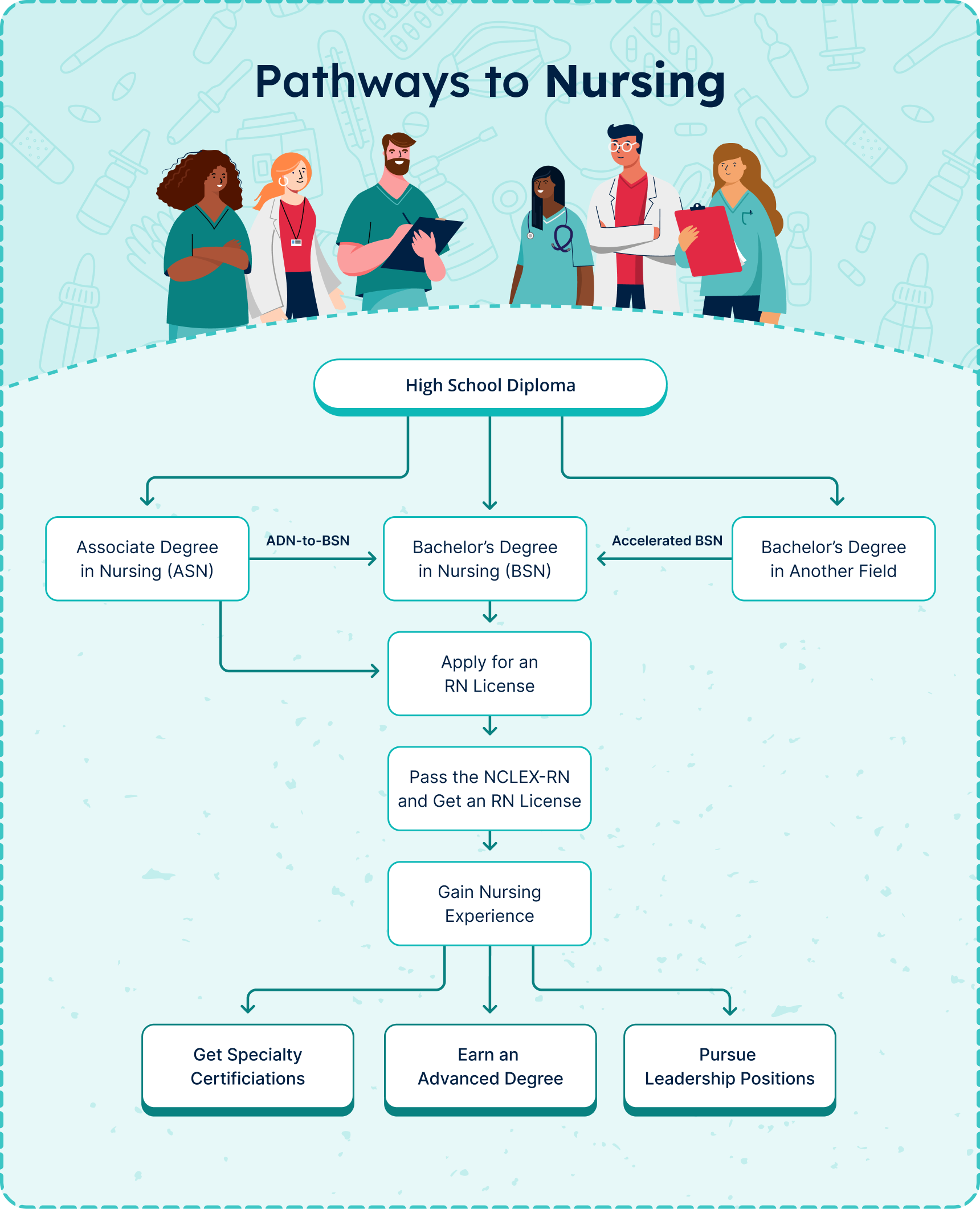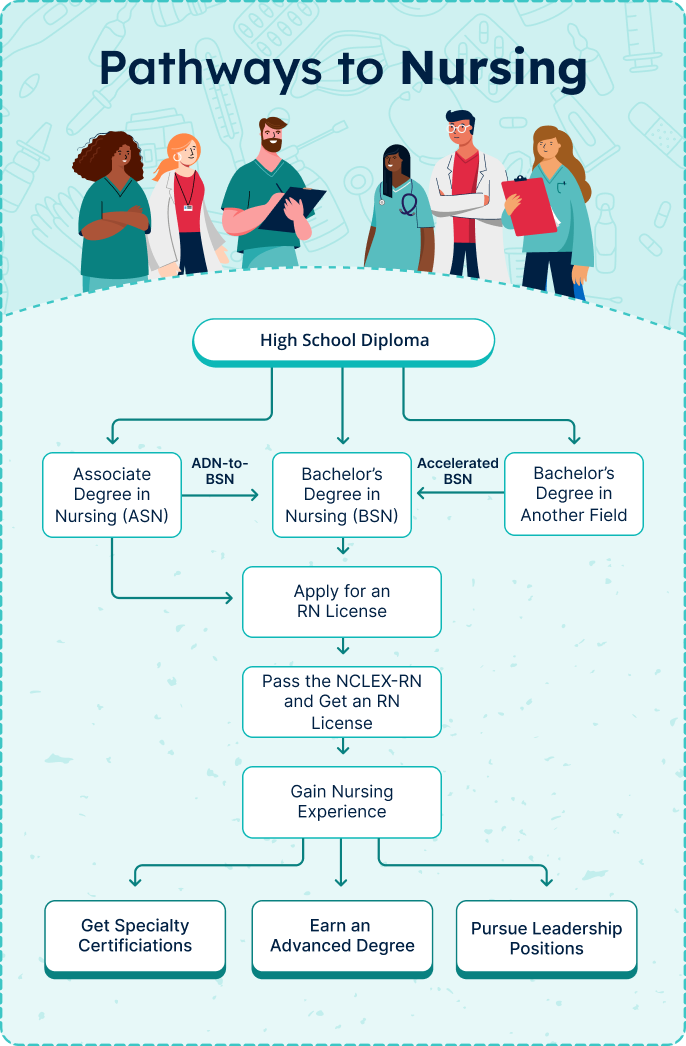Explore Nursing Pathways: Two Ways to Become a Registered Nurse (RN)
- You can choose between two degrees to become a registered nurse.
- Advancing your nursing education can lead more job opportunities and higher pay.
- You can advance your career with leadership positions and specialty certifications.
Do you want a rewarding healthcare career with more autonomy? Registered nurses (RNs) work with advanced practice providers and may supervise nursing assistants and licensed practical nurses (LPNs).
Find out how to advance your nursing career, and learn about common RN pathways and specialties in this guide.
Pathways to Becoming a Nurse
If you want to become a registered nurse, you have two pathways to take the NCLEX-RN and become licensed in your state. The best path for you depends on how much time and money you have and what you want to do with your nursing career. Learn more about associate degrees in nursing (ADN) and bachelor’s degrees in nursing (BSN) and how they can impact your nursing career.


Most Common Pathway
Forty-nine percent of practicing RNs started their pathway into nursing with an ADN in 2018, according to the Health Resources and Services Administration. An ADN can offer a faster and cheaper way to start your nursing career than a BSN.
You can earn your ADN with two years of full-time study. The average annual cost of tuition and fees for a two-year degree was $3,860 in the 2021-22 school year, about $13,000 less per year than the cost of a four-year degree, according to the National Center for Education Statistics.
The ADN curriculum teaches you how to practice nursing safely, legally, and ethically. You’ll learn fundamental nursing skills like:
- Taking vital signs
- Collaborating with other healthcare professionals
- Controlling infection
- Giving medication and treatment
After you start your career, you can enroll in an ADN-to-BSN program to get your BSN in as few as 18 months and broaden your opportunities in nursing.
Employer-Preferred Pathway
A BSN is the most preferred nursing degree among employers. A BSN offers you more opportunities for advancement into leadership positions. Almost 72% of employers prefer BSN-prepared nurses, according to the American Association of Colleges of Nursing (AACN). More than 27% require nurses to have a BSN.
Earning your BSN will take about four years of full-time study. However, you may spend less time in nursing school if you’re a practicing nurse or pursuing nursing as a second career. During your BSN program, you’ll learn about nursing leadership, research, and informatics, in addition to the fundamental nursing skills in an ADN program.
Pathways to Advancing Your Nursing Career in Nursing
After you earn your nursing degree, pass the NCLEX, and get your RN license, you’ll need to renew your license every two years by practicing nursing, earning specialty certification, or completing continuing education.
The pathway to advancing your nursing career will vary depending on your career goals and interests. You can grow your career by earning a certification, pursuing leadership positions, or furthering your education.
Earn a specialty certification
Specialty certifications show employers your experience and expertise in a specialty. Some employers prefer certified nurses. You’ll usually need about two years of practice in your chosen specialty and a passing score on a certification exam to become certified. You’ll need to pay a renewal fee and complete continuing education every two years to maintain your certification.
Complete your continuing education to renew your license
You’ll need to fulfill the continuing education contact hours required by your state to renew your RN license. You may be able to meet your continuing education requirements by teaching university nursing classes, practicing nursing, completing continuing education units, or holding a specialty certification. Some states require you to complete continuing education in specific topics, such as human trafficking.
Advance your education
Going back to school for your BSN, master’s degree in nursing (MSN), or doctorate in nursing practice (DNP) can offer you more opportunities, autonomy, responsibilities, and pay. Getting an MSN allows you to earn an average of $10 more an hour than BSN-prepared nurses, according to Payscale. It also opens you up to leadership opportunities, like director of nursing. A DNP opens you up to advanced practice opportunities like certified registered nurse anesthetist (CRNA).
Become an advanced practice registered nurse (APRN)
If you want a nursing career with more responsibilities and autonomy, consider becoming an APRN. Choose a degree program with your intended career track: clinical nurse specialist (CNS), nurse practitioner (NP), certified nurse midwife (CNM), or certified registered nurse anesthetist (CRNA). To become an APRN, you’ll need an advanced nursing degree, an RN license, at least two years of clinical experience, and a license and certification to practice in your specialty.
Become a nurse educator
If you want to train new nurses, you can become a clinical preceptor or a nursing professor. Nursing professors teach clinical and non-clinical classes in nursing school, while clinical preceptors supervise nursing students in their clinical placements. To become a nurse educator, you need at least an MSN and a couple of years of nursing experience, though some positions require you to have a DNP.
Consider pursuing leadership positions
Choose nursing leadership as your next step in nursing if you want to provide nurses with the resources and guidance they need to provide quality care. You can become a charge nurse with a BSN and a few years of experience. However, jobs in nursing administration require at least an MSN.
Consider These Nursing Specialties
You must choose a specialty once you earn your degree and nursing license. Consider the experience required, average pay, work schedule, and stress levels before you choose a specialty.
Some specialties, like perioperative nursing, require you to have previous paid nursing experience. Other specialties, like medical-surgical nursing, are available for entry-level nurses and nurse residents.
Registered Nurse Specialties
Acute Care/Critical Care
Critical care nurses care for patients who are critically ill or injured and need closer monitoring than other floors in the hospital provide. They can work in pediatric, adult, and neonatal intensive care units or telehealth and step-down units. They operate complex medical equipment, work with an interdisciplinary healthcare team, and give medications and treatment.
Geriatrics/Gerontology
Gerontology nurses work with older adults to help them maintain their independence and quality of life as they age. They may work in skilled nursing facilities, hospitals, or home health. They assist patients with activities of daily living, create and implement treatment plans, and monitor for signs of elder abuse.
Emergency/Trauma
Emergency room (ER) nurses triage and stabilize patients with severe or life-threatening illnesses and injuries when they arrive in the emergency room. They monitor vital signs, respond to changes, provide medication and treatment, and document care plans. Some ER nurses specialize in pediatrics, geriatrics, or trauma.
Medical-Surgical
Medical-surgical nurses, also called med-surg nurses, care for patients after the emergency, intensive care, or surgical team releases them to the medical-surgical floor. They monitor patients’ vital signs, update medical records, dress wounds, change bandages, and answer patients’ questions.
Perioperative
Perioperative nurses care for patients before, during, and after surgery. They prepare the operating room (OR) for surgery, advocate for patients, help control bleeding, alert the surgical team to issues, and prepare patients for the recovery room. Your responsibilities will vary depending on the role you’re assigned in the OR, such as a scrub nurse.
Nurse Practitioner Specialties
Family
Family nurse practitioners (FNP) provide primary care to patients in all stages of life, from infant to adult. Most FNPs see adolescents and adults primarily. FNPs offer preventive care, order and interpret diagnostic tests, diagnose patients, and make treatment plans.
Adult Gerontology
Adult gerontology nurse practitioners can work in primary or acute care. NPs certified in adult-gerontology primary care focus on the changing needs of older adults and maintaining their patients’ health throughout their adult lives. However, adult gerontology NPs who practice acute care focus on managing chronic conditions and preventing future complications.
Psychiatric Mental Health
Psychiatric mental health nurse practitioners address the mental health needs of children, adolescents, and adults. They diagnose and treat mental health and substance misuse conditions, educate family members, and prescribe medications.
Pediatric Primary Care
Primary care certified pediatric nurse practitioners examine and treat patients throughout their childhood, from infancy to adolescence. They must understand normal and abnormal development in children and adolescents and be able to keep up with the changes and growth in their patients.
Women’s Health
Women’s health nurse practitioners provide primary and reproductive care to girls, women, and people assigned female at birth. They provide prenatal care before and during pregnancy and preventative care such as Pap smears and breast exams.
How to Choose Which Nursing Pathway Is Right For You
When you choose which nursing pathway to take, consider the costs, time commitment, salary potential, and career opportunities for each degree.
An ADN allows you to spend less on your education and start your nursing career sooner. However, you’ll need to enroll in an ADN-to-BSN program to earn higher salaries and apply for nursing positions, including leadership roles, requiring a BSN.
A BSN offers more opportunities and greater salary potential in the long term, but it will be more expensive and time-consuming in the short term. Compare different types of nursing degrees to find out which one is right for you.
Time Commitment
You can finish an ADN with half the credits that a BSN requires and start your nursing career sooner. If you want to earn your BSN later in your career, you can enroll in a two-year RN-to-BSN program.
Cost
You could save an average of more than $13,000 per year in tuition with an ADN compared to a BSN.
NCLEX-RN Pass Rate
The NCLEX-RN first-time pass rate for BSN graduates was more than 4% higher than the NCLEX-RN pass rate for ADN graduates in 2022, according to the National Council of State Boards of Nursing.
Career Opportunities
Most employers prefer or require nurses to hold a BSN. A BSN opens you up to more career and leadership opportunities, higher pay, and more autonomy than an ADN.
Frequently Asked Questions About Nursing Pathways
Why get a BSN instead of an RN?
A BSN offers more career opportunities, higher pay, and more autonomy than an ADN alone. Nearly 72% of employers strongly prefer BSN graduates, according to the American Association of Colleges of Nursing. Almost 28% of employers require nurses to hold a BSN.
How do I choose a nursing specialty?
Consider several factors before choosing a nursing specialty, including the required experience, certifications, work schedule, pay, demand, and stress levels.
What is the pathway for nursing?
The pathway into nursing includes earning a nursing degree, passing the NCLEX-RN, getting your RN license, and finding a nursing position. Once you get your first nursing job, you must complete continuing education to maintain your license, earn a certification, and consider pursuing leadership positions or advanced education.
How fast can you become a nurse?
You can become an RN in as little as two years with an associate degree in nursing. However, some opportunities may require you to return to school to get your BSN or an advanced nursing degree.
Is there a pay difference between ADN and BSN?
Yes, nurses with a BSN earn an average of $35 per hour, about $3 more per hour than the average hourly wage for nurses with an ADN, according to Payscale data from July 2023. This difference in hourly wages averages $16,000 more annually for BSN graduates.





